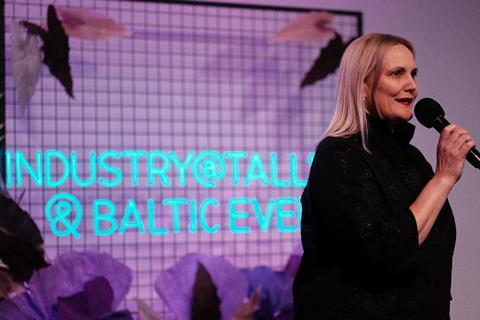
There is only so much more room to expand for the ambitious Industry@Tallinn & Baltic event, the professional platform of Tallinn Black Nights Film Festival.
“There have been so many rapid developments in the past few years that we keep adding sections,” says industry head Marge Liiske. “But our size is something that is always highlighted to us by participants as a positive.”
Last year’s event had to close accreditations early because capacity had already been reached. This year, over 800 people are expected to attend, and Liiske hopes to keep it that way.
“We are very accessible, it is easy to make contact with people here and it never gets too crowded,” she continues. “You can’t say 800 people and call it intimate, but it has that vibe. It doesn’t have too much bureaucracy.”
The Industry@Tallinn & Baltic Event takes place from November 14-23. The programme launches with the short film activity this weekend, ahead of the TV Beats forum from November 17 before the feature film activities launch.
This year’s event also features a Focus on Catalan and the Spotlight Country on Austria, as well as the Baltic Event Co-Production Market which has 15 titles and a Works in Progress strand.
Liiske talks to Screen about the key topics the programme will be exploring, including the constructive use of AI, understanding private film financing and the importance of films for children and young people to the industry and the festival.
Inflation is still very high in Estonia. What impact has that had on the Industry@Tallinn programme?
We’ve managed to get some new partnerships this year, and there is also financing from Creative Europe Media. It would not have been possible without these public supporters.
[But ]there are fewer free services available this year, and the parties are not the same. Most people have to pay for their flights and their accreditation fees. We’ve also had to charge an admin fee for the first time when applying for accreditation.
That is a lot of trust to be put in our platform, when people are putting down their own money. I hope that what we provide here, both programme-wise and the human networking and contacts that they can have, makes it up to them.
What are some of the key themes being covered across the 2025 industry programme?
There’s a little bit more focus on financing this year. We always talk about public financing, this year with the Catalans and the French CNC for example. But we also wanted to talk about private financing. We have sessions in both the drama series and the film section to explain how this works.
Children and youth are also an important part of the programme. We have our Youth Film Industry days but we want to stress it across all genres. We have specialised panels but we expect everybody to take part in them, to understand the role these films play a bit more. Why aren’t they treated as equals? Why aren’t we putting more emphasis on children and youth films?
How is the programme tackling the evolving role of AI in the film industry?
Many panels on the topic of AI in Europe are often about how we are doomed because of AI but we want to see how it’s possible. We talk about screenwriting, we talk about filmmaking, and then we talk about the very important part, which is regulation within AI.
We’re in a transitory year because next year we are launching a course called MAIEFP [Mastering AI for European Film Producers] which is a strategic executive-focused leadership program based on the pioneering MiniMBA at the National Film School of Denmark. The focus is to move beyond the “AI threat” debate to equip European leaders in the audiovisual industry with the tools to compete and apply AI strategically.
What are some of the additions in this year’s expanded series programme?
We are always adding one or two new things every year and this year, the drama series definitely had room to grow. We have added a new section called Serial Bridges – Baltics, which is in collaboration with Series Mania Institute and the French Institute. They are hosting serial development workshops for projects from Estonia, Latvia and Lithuania.
The other addition is Coming Soon From The Baltics, which is for the serial projects in development that we have at the co-financing market that are still looking for financing and then distribution. We might develop the series part a little further next year because there is still room for growth.
US costume designer Debra McGuire and hair stylist Nina Paskowitz are among the speakers in the Discovery Campus programme. What was the appeal of bringing them in?
Each year, we try to shine a spotlight on a different area [of the film industry]. We are thrilled people who have worked on all these major Hollywood productions still want to come to tiny Tallinn because they have heard good feedback, it’s been recommended to them and they know the time they are putting in here will be worth it.

























No comments yet